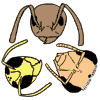 |
IUSSI North-west European section
International Union for the Study of Social Insects |
| who's where | vacancies | INSECTSmail |
Vacancies
 |
IUSSI North-west European section
International Union for the Study of Social Insects |
| who's where | vacancies | INSECTSmail |
Vacancies
Here you will find details of social insect related job vacancies, studentships and grants currently available. If you have any social insect related vacancies that you would like to have advertised here, please e-mail to INSECTS@bio.ku.dk. All advertisements must include either a closing date for applications, or a date on which they may be removed from the web site. This page was last modified on Monday, September 15, 2025
No vacancies - please let us know if you have any to be advertised
Currently no vacancies, but will be updated soon
Posted 15/9/2025
Vacancies will be advertised on this page until the closing date for applications, or, where no firm closing date is given, for a maximum of 3 months.
If a position has been filled in the meantime, please let the webmaster know.
This site is maintained and promoted on the Internet by David Nash. email to: DRNash @ bio.ku.dk
Last modified